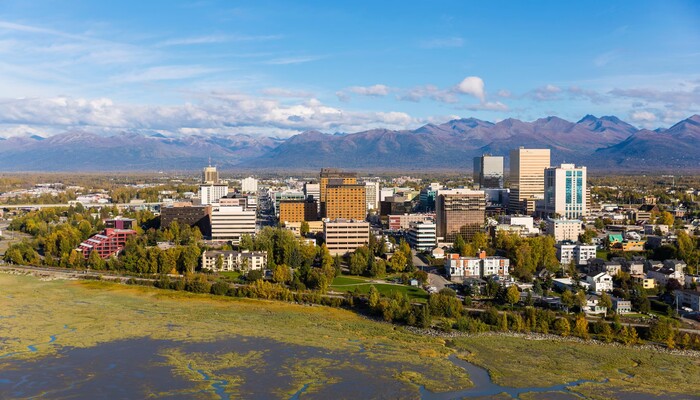The Anchorage summit between Donald Trump and Vladimir Putin is set for Friday, and the city is buzzing. While many residents enjoy one of the last good summer weekends—prime salmon fishing and berry season—there’s a mix of anticipation and anxiety over what the meeting could mean for Alaska’s future. Some are eager for the attention; others fear unwelcome political surprises.
Summer Plans Versus Political Drama
Anchorage locals are determined not to let politics disrupt their final summer outings. Andy Moderow, who works at a conservation nonprofit, plans to take his boat to Prince William Sound. News site owner Jeff Landfield noted many have voiced similar sentiments online, with some bluntly saying they don’t want their plans “messed up” by the summit.
The city of just under 300,000 sits at the base of the Chugach Mountains and along the Cook Inlet. Its spread-out neighborhoods, birch stands, and downtown shops selling Alaska Native crafts give it a distinctive charm. Residents often refer to the rest of the US as “the lower 48,” a phrase that reflects their independent streak.
Read: Eli Lilly Hikes UK Price of Mounjaro by Up to 170%
A History of High-Profile Visits
This is not Anchorage’s first brush with high-level diplomacy. In 2017, Chinese president Xi Jinping stopped in the city after meeting Trump in Florida, dining on local seafood. Two years later, Anchorage hosted a tense meeting between Chinese and US officials, marked by public clashes over human rights and racism.
Still, locals say this summit feels different. Russia, after all, is not just a distant geopolitical player—it is Alaska’s neighbor across the Bering Strait. Russian jets occasionally approach Alaskan airspace, and its fishing industry is seen as competing directly with Alaska’s.
Between Pride and Caution
Retired state senator Hollis French said there’s pride in seeing Anchorage “back on the map,” but also skepticism about what Trump might agree to. When Trump mentioned meeting Putin “in Russia,” some joked nervously about being sold back to Moscow—a reference to Alaska’s 1867 purchase from the Russian Empire.
Moderow, who grew up during the Cold War, recalls nuclear drills and fallout shelters as part of daily life. French stressed that while Alaskans recognize Russia as a hostile neighbor, they distinguish between its people and its leadership. “People don’t like Putin. It’s not Russia or Russians,” added Landfield.
Cultural Ties Across the Strait
Despite political tensions, Alaska maintains some cultural links to Russia. These include university exchange programs and communities of Old Believers, members of the Russian Orthodox Church who settled in Alaska to escape religious repression. Such ties don’t erase concerns, but they add nuance to local perspectives on the summit.
Opposition to Putin’s Visit
Putin’s arrival has sparked criticism, especially given the International Criminal Court’s arrest warrant against him. Political reporter Matt Acuña Buxton said many Alaskans view Putin and his administration as unfriendly to their state’s interests.
The White House has confirmed the meeting will take place at a military base in northeast Anchorage, which some residents find disappointing. Colleen Heaney-Mead noted that events on base “don’t feel like they really happen in Alaska.”
Locals Offer Alternative Venues
Anchorage residents have embraced satire as a way to cope with summit tensions. A poll by the Alaska Landmine suggested Sarah Palin’s house as a potential meeting site. The Alaska Memo newsletter proposed hiking Flattop Mountain or staying at the humorously named Skinny Dick’s Halfway Inn on the road to Fairbanks.
Landfield called the situation “a meme-rich environment,” while Acuña Buxton said humor helps people manage the improbable notion of Alaska being “traded” back to Russia.
The Larger Global Context
While jokes abound locally, residents recognize the global stakes. The Anchorage summit is ultimately tied to the war in Ukraine and broader US-Russia relations. Still, for many Alaskans, it’s also a moment to reflect on their unique position—geographically close to Russia, culturally distinct from the rest of the US, and historically shaped by both.
The meeting may not alter daily life in Anchorage, but it has already sparked conversations about sovereignty, identity, and the balance between local life and global politics. Whether viewed with excitement or skepticism, the summit has firmly placed Alaska in the international spotlight.
Follow us on Instagram, YouTube, Facebook,, X and TikTok for latest updates
